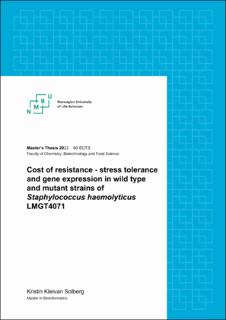| dc.contributor.advisor | Snipen, Lars-Gustav | |
| dc.contributor.advisor | Diep, Dzung Bao | |
| dc.contributor.author | Solberg, Kristin Kleivan | |
| dc.date.accessioned | 2022-12-19T09:26:55Z | |
| dc.date.available | 2022-12-19T09:26:55Z | |
| dc.date.issued | 2022 | |
| dc.identifier.uri | https://hdl.handle.net/11250/3038415 | |
| dc.description.abstract | Several studies have shown that a bacteria’s development of resistance to an antimicrobial substance often comes with a cost related to their general fitness and adaptation to environmental changes. Further research is needed to increase the understanding on how bacteria with mutations in specific genes associated with stress tolerance, regulate their gene expression in response to stress.
The excessive use of antibiotics for treatment of pathogenic infections in patients have led to an increasing number of bacteria resistant to antibiotics. As it is crucial that we find alternative treatment methods, researchers are looking into the possibility of utilizing bacterial produced bacteriocins in combination with other antimicrobials. In the search for appropriate medicine, we need a broader knowledge of the bacteria’s response mechanisms related to the treatments.
Through this master’s thesis a mutant’s loss of fitness due to a resistance mutation will be examined. The study will attempt to give new inside on how a mutant of a bacterium regulates its gene expression when exposed to stress compared to the wild type within the same strain. Specific for this study, mutants within five bacterial strains with mutations connected to the function of the stress-response related gene rseP, are inspected in the laboratory. The bacteria were exposed to the bacteriocin Garvicin KS which do not use RseP as a receptor. RNA from samples of S. haemolyticus LMGT4071 will be isolated and sequenced to analyse the gene expression in wild type and mutant, with and without exposure to GarKS.
The experiments with S. haemolyticus in the laboratory show that the mutant tolerates the exposure to GarKS poorer than the WT, illustrating that the development of resistance comes with a fitness cost. The transcriptome analysis show that the mutant responds to the stress by altering its gene expression to a large extent, in contrast to the WT which turns on only a few genes. | en_US |
| dc.description.abstract | Flere studier har vist at en bakteries utvikling av resistens mot et antimikrobielt stoff ofte kommer med en kostnad knyttet til deres generelle fitness og tilpasning til miljøendringer. Det er behov for videre forskning for å øke forståelsen av hvordan bakterier med mutasjoner i spesifikke gener knyttet til stresstoleranse regulerer genuttrykket sitt i respons på stress.
Overdreven bruk av antibiotika for behandling av patogene infeksjoner hos pasienter har ført til at et økende antall bakterier er resistente mot antibiotika. Siden det er avgjørende at vi finner alternative behandlingsmetoder, ser forskerne på muligheten for å utnytte bakteriell produserte bacteriociner i kombinasjon med andre antimikrobielle midler. I jakten på passende medisin trenger vi bredere kunnskap om bakterienes responsmekanismer knyttet til behandlingene.
Gjennom denne masteroppgaven vil en mutants tap av fitness grunnet en resistensmutasjon undersøkes. Studien vil prøve å belyse hvordan en mutant av en bakterie regulerer genuttrykket sitt når det utsettes for stress sammenlignet med villtypen innenfor samme stamme. Spesifikt for denne studien inspiseres mutanter innenfor fem bakteriestammer med mutasjoner knyttet til funksjonen til det stress-responsrelaterte genet rseP i laboratoriet. Bakteriene ble eksponert for bacteriocinet Garvicin KS som ikke bruker RseP som reseptor. RNA fra prøver av S. haemolyticus LMGT4071 vil bli isolert og sekvensert for å analysere genuttrykket i villtype og mutant, med og uten eksponering av GarKS.
Forsøkene med S. haemolyticus i laboratoriet viser at mutanten tåler eksponeringen av GarKS dårligere enn villtypen, noe som illustrerer at utvikling av resistens kommer med en fitnesskostnad. Transkriptomanalysen viser at mutanten reagerer på stresset ved å endre genuttrykket sitt i stor grad, i motsetning til villtypen som kun slår på noen få gener. | en_US |
| dc.language.iso | eng | en_US |
| dc.publisher | Norwegian University of Life Sciences, Ås | en_US |
| dc.rights | Attribution-NonCommercial-NoDerivatives 4.0 Internasjonal | * |
| dc.rights.uri | http://creativecommons.org/licenses/by-nc-nd/4.0/deed.no | * |
| dc.title | Cost of resistance : stress tolerance and gene expression in wild type and mutant strains of Staphylococcus haemolyticus LMGT4071 | en_US |
| dc.type | Master thesis | en_US |
| dc.description.localcode | M-BIAS | en_US |

